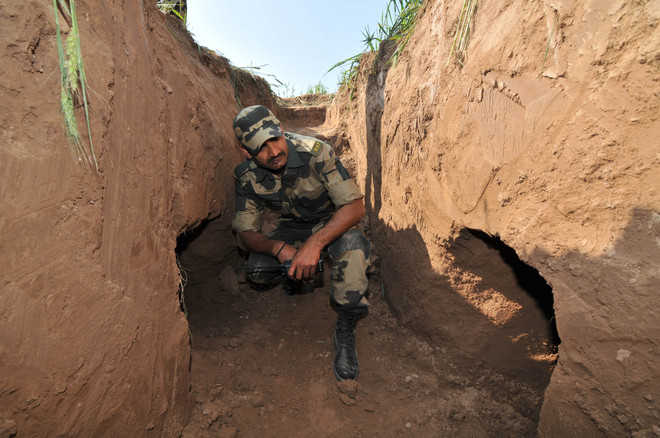
A tran-sborder tunnel originating from Pakistan that opened 30m inside Zero Line on the Indo-Pak border in RS Pura sector of Jammu district.
Shaurya Karanbir Gurung
Tribune News Service
New Delhi, March 9
The discovery of a 30-foot-long and 10-foot-deep tunnel running through the international border (IB) in the RS Pura sector of Jammu district has highlighted the need for a tunnel-detection technology.India has been finding it difficult to fulfil its plan to equip the new anti-infiltration system with a tunnel-detection technology. It has sought information on the tunnel-detection system from Israel, which claims to have used such technology to guard its borders and prevent cross-border attacks.“The possibility of more tunnels being found along the IB cannot be ruled out. The BSF discovered the tunnel in the RS Pura sector only after a portion of the tunnel had caved in. But what if there is a tunnel made of concrete? India needs technologies to detect such tunnels,” said a government official.“The Israelis claim to have seismic technology and ground-penetrating radars. But these tools can only work up to a certain depth. They are useful for Israel which has a shorter border with the West Bank and Gaza strip as compared to our border (IB). It is yet to see how to use the radar technology along the Indian borders,” said a security official.A 2012 BSF committee, constituted to submit a report on patches along the IB where the water level is low and the soil is conducive to digging tunnels, said there were areas vulnerable to tunnelling in Jammu and Punjab.The committee report said the radar technology would not be able to detect deep tunnels like the one found in Jammu in 2012 which was 30-foot-deep.At present, the BSF has been using counter-measures such as driving tractors over areas vulnerable to tunnelling and second-tier deployment along the IB in Jammu. But even these measures cannot pinpoint the exact location of a tunnel.Besides, the BSF believes persons (from Pakistan) may use underwater and aerial means to infiltrate into the country. “This could be done using machines to move under the surface of a river meandering between India and Pakistan,” said the official.
Anti-infiltration system
The anti-infiltration system with the tunnel-detection technology, which India plans to procure, is called the Comprehensive Integrated Border Management Solution (CIBMS). It integrates sensors, communication, infrastructure, response, and command and control. It will be set up along the IB with Pakistan, including the unfenced gap. The CIBMS system has also been planned to counter infiltration with the use of technologies such as SONAR.
